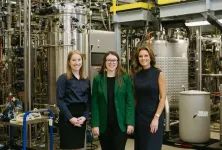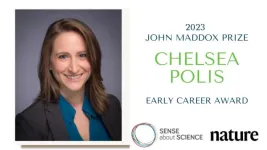(Press-News.org) By Katharine Gammon
For many people, forgetting your keys or struggling to plan tasks can seem like a normal part of the aging process. But those lapses can actually be symptoms of something more serious: mild cognitive impairment, or MCI, which could be an early sign of Alzheimer’s disease.
Unfortunately, most people who have MCI don’t know it, so they’re unable to take advantage of preventive measures or new treatments, such as a recently approved drug for Alzheimer’s disease, that could slow its progression. Those are the findings of two new studies published in parallel by researchers at the USC Dornsife College of Letters, Arts and Sciences.
In one study, published in Alzheimer’s Research & Therapy, the researchers analyzed data from 40 million Medicare beneficiaries age 65 and older and compared the proportion diagnosed with the rate expected in this age group. They found that fewer than 8% of expected cases were actually diagnosed. In other words, of the 8 million individuals predicted to have MCI based on their demographic profile, which includes age and gender, about 7.4 million were undiagnosed.
“This study is meant to raise awareness of the problem,” says Soeren Mattke, director of the Brain Health Observatory at USC Dornsife’s Center for Economic and Social Research, who led the investigations. “We want to say, ‘Pay attention to early changes in cognition, and tell your doctor about them. Ask for an evaluation.’ We want to reach physicians to say, ‘There’s a measurable difference between aging and pathologic cognitive decline, and detecting the latter early might identify those patients who would benefit from recently approved Alzheimer’s treatments.
The prevalence of MCI is influenced by socioeconomic and clinical factors. People with cardiovascular disease, diabetes, hypertension and other health issues are at higher risk of cognitive decline including dementia. These health issues are more prevalent among members of historically disadvantaged groups, including those with less education and Black and Hispanic Americans.
The researchers found that detection of MCI was even poorer in those groups. Mattke says that’s concerning because the overall disease burden in those populations is higher. “So, they’re hit twice: They have higher risk and yet lower detection rates.”
The second study, published in Journal of Prevention of Alzheimer's Disease looked at 200,000 individual primary care clinicians and found that 99% of them underdiagnosed MCI. “There’s really just a tiny fraction of physicians in a position to diagnose MCI who would find these cases early enough for maximum therapeutic potential,” Mattke explains.
MCI by definition doesn’t cause disability, whereas dementia is itself a disabling condition reflecting more serious cognitive impairment. In MCI, challenges to everyday functioning tend to be more sporadic, says Soo Borson, clinical professor of family medicine at Keck School of Medicine of USC and co-lead of the BOLD Center on Early Detection of Dementia, who was not involved in the studies.
MCI can come in various forms: forgetfulness is the most familiar form, Borson says. Another is an executive form, which mainly affects efficiency in getting things done and difficulty with tasks that used to be easier, such as balancing a checkbook or paying bills online. There is even a behavioral form — in which mild changes in personality may predominate. These various forms often coexist.
It is important to understand that MCI refers to a level of cognitive functioning and not a specific disease state. Recent advances in the treatment of the most common cause of MCI — Alzheimer’s disease — lend new urgency to improving detection of MCI.
There are several reasons MCI might be so widely underdiagnosed in the United States. An individual may not be aware of or bring up their concern; a physician might not notice subtle signs of difficulty; or a clinician might notice but not correctly enter the diagnostic code in a patient’s medical record.
Another important reason: Time during a clinical visit may not be set aside to discuss or assess brain health unless the visit was planned expressly to include it. Detection of cognitive impairment is not difficult, but it does not occur without planning.
Mattke notes that risk-based MCI detection — focusing attention on people at greatest risk — would help identify more cases because time and resources could be focused on those high-risk individuals. Digital tests that could be administered before a medical visit could also help more people learn about their cognitive risk and current functioning.
Early treatment is vital, says Mattke, because the brain is limited in its ability to recover — brain cells, once lost, do not grow back, and any damage can no longer be repaired.
“For MCI caused by Alzheimer’s disease, the earlier you treat the better your outcomes,” he says. “This means even though the disease may be slowly progressing, every day counts.”
END
Undiagnosed: More than 7 million Americans unaware they have mild cognitive impairment
Two new USC Dornsife studies suggest that of the 8 million Americans who have MCI, more than 90% don’t know it — an especially worrisome finding since early diagnosis is key to delaying onset of dementia and Alzheimer’s disease.
2023-10-25
ELSE PRESS RELEASES FROM THIS DATE:
GigXR partners with NUS Medicine to deliver holographic clinical scenarios for gastroenterology training
2023-10-25
GigXR, Inc., a global provider of holographic healthcare training, announced today its partnership with the Yong Loo Lin School of Medicine, National University of Singapore (NUS Medicine), one of the world’s leading medical schools, to introduce a new gastrointestinal module for the award-winning HoloScenarios application. Created to better prepare medical and nursing students in diagnosing and treating acute gastrointestinal diseases, HoloScenarios: Gastrointestinal delivers evidence-based, robust clinical simulations that present hyperrealistic holographic simulated patients and medical equipment to be used in any physical learning environment, ...
Sylvester Comprehensive Cancer Center tipsheet for Oct. 2023
2023-10-25
Cancer Leadership
Sylvester Leader Named BioFlorida’s ‘Researcher of Year’
Stephen D. Nimer, MD, Sylvester Cancer director, has been named Researcher of the Year by BioFlorida, an association for the state’s life sciences industry. BioFlorida represents 8,600 companies and research organizations in biopharmaceuticals, medical technology, digital and health systems. It honored Nimer for his groundbreaking research in adult leukemia which has contributed to transforming patient care. For details, visit the InventUM blog.
Pioneering Sylvester Physician Elected to Neuro-Oncology Board
Macarena de la Fuente, ...
UC Riverside physicist awarded National Medal of Science
2023-10-25
RIVERSIDE, Calif. -- Physicist Barry C. Barish, a distinguished professor of physics and astronomy at UC Riverside, was awarded the National Medal of Science by President Joe Biden at a ceremony held at the White House today. Established in 1959 by the U.S. Congress, the National Medal of Science is the highest recognition the nation can bestow on scientists and engineers.
The President’s National Medal of Science is given to individuals “deserving of special recognition by reason of their outstanding contributions in biology, computer sciences, education sciences, engineering, geosciences, mathematical and physical sciences, and social, behavioral, and economic ...
Daily 20-25 mins of physical activity may offset death risk from prolonged sitting
2023-10-25
Clocking up just 20-25 minutes of physical activity every day may be enough to offset the heightened risk of death from a highly sedentary lifestyle, suggests research published online in the British Journal of Sports Medicine.
But higher daily tallies of physical activity are linked to a lower risk, irrespective of the amount of time spent seated every day, the findings show.
In developed nations, adults spend an average of 9 to 10 hours every day sitting down—mostly during working hours. And a highly sedentary lifestyle is associated with a heightened risk of death, explain the researchers.
Much of the ...
Extending annual screen for diabetic eye disease to 2 years for those at ‘low risk’ could risk treatment delays and/or sight loss
2023-10-25
Extending the annual screen by a year for people in England considered to be at low risk of diabetic eye disease (diabetic retinopathy) could risk critical treatment delays and/or sight loss, suggests a large, real world data study, published online in the British Journal of Ophthalmology.
Early treatment is vital to stave off blindness, say the researchers. A 2-yearly screen delayed hospital referral by 12 months among around half of those who developed serious diabetic eye disease, with those at either end of the age spectrum and of Black ethnicity most at risk, the findings indicate.
A review and update of ...
Tai Chi may curb Parkinson’s disease symptoms and complications for several years
2023-10-25
Tai Chi, the Chinese martial art that involves sequences of very slow controlled movements, may curb the symptoms and complications of Parkinson’s disease for several years, reveals research, published online in the Journal of Neurology Neurosurgery & Psychiatry.
Its practice was associated with slower disease progression and lower doses of required drugs over time, the findings show.
Parkinson’s disease is a debilitating and progressive neurodegenerative disorder, characterised by slowness of movement, resting tremor, and stiff and inflexible muscles.
It is the fastest growing neurological ...
Public support for extending the 14-day rule on human embryo research indicated by foundational dialogue project
2023-10-25
The findings of a foundational UK public dialogue on human embryo research are published today, Wednesday 25th October 2023, as part of the Wellcome-funded Human Developmental Biology Initiative (HDBI). The HDBI is an ambitious scientific endeavour to advance our understanding of human development. The dialogue project, which was co-funded by UKRI Sciencewise programme, engaged a diverse group of the public to consider how early human embryo research can be used to its fullest, the 14-day rule and the fast-paced field of stem cell-based embryo models.
Headline findings include:
Appetite for review of the 14-day rule: Participants recognised that extending the 14-day rule could open ...
Edward Bluth awarded the Lawrence A. Mack Lifetime Achievement Award by Society of Radiologists in Ultrasound
2023-10-25
NEW ORLEANS, La.— Ochsner Health radiologist Edward Bluth, MD, FACR, was recently awarded the 2023 Lawrence A. Mack Lifetime Achievement Award in Washington D.C. by the Society of Radiologists in Ultrasound (SRU) for outstanding achievement in ultrasound research.
The Lawrence A. Mack Lifetime Achievement Award is the highest annual award given to a SRU member. The SRU, comprised of radiologists with expertise in ultrasound, works towards advancing science, practice and teaching of the specialty of ultrasound to ensure the professional fulfillment of radiologists performing ultrasound ...
Central Illinois named US Tech Hub for biomanufacturing by Biden-Harris administration
2023-10-25
URBANA, Ill. — President Joe Biden announced Monday that the Illinois Fermentation and Agriculture Biomanufacturing Hub (iFAB) is among 31 designated Regional Innovation and Technology Hubs (Tech Hubs) by the U.S. Economic Development Administration (EDA) — recognizing Central Illinois as a globally competitive center for innovation and job creation in biomanufacturing.
Led by the Integrated Bioprocessing Research Laboratory (IBRL) at the University of Illinois Urbana-Champaign, the iFAB consortium includes 30 partner organizations ...
Chelsea Polis awarded the 2023 John Maddox Prize
2023-10-25
Dr. Chelsea Polis, Senior Scientist of Epidemiology at the Center for Biomedical Research, has been selected as the Early Career winner of this year’s John Maddox Prize. The John Maddox Prize recognises individuals who stand up for science, despite hostility, to bring evidence to the public. Stories highlighted by the Maddox Prize show the harm done to society when sound scientific evidence and insights are not shared. The prize brings attention to the courage shown by individuals who take responsibility for helping society understand research evidence, and who encourage and inspire others ...
LAST 30 PRESS RELEASES:
Nanoplastics can interact with Salmonella to affect food safety, study shows
Eric Moore, M.D., elected to Mayo Clinic Board of Trustees
NYU named “research powerhouse” in new analysis
New polymer materials may offer breakthrough solution for hard-to-remove PFAS in water
Biochar can either curb or boost greenhouse gas emissions depending on soil conditions, new study finds
Nanobiochar emerges as a next generation solution for cleaner water, healthier soils, and resilient ecosystems
Study finds more parents saying ‘No’ to vitamin K, putting babies’ brains at risk
Scientists develop new gut health measure that tracks disease
Rice gene discovery could cut fertiliser use while protecting yields
Jumping ‘DNA parasites’ linked to early stages of tumour formation
Ultra-sensitive CAR T cells provide potential strategy to treat solid tumors
Early Neanderthal-Human interbreeding was strongly sex biased
North American bird declines are widespread and accelerating in agricultural hotspots
Researchers recommend strategies for improved genetic privacy legislation
How birds achieve sweet success
More sensitive cell therapy may be a HIT against solid cancers
Scientists map how aging reshapes cells across the entire mammalian body
Hotspots of accelerated bird decline linked to agricultural activity
How ancient attraction shaped the human genome
NJIT faculty named Senior Members of the National Academy of Inventors
App aids substance use recovery in vulnerable populations
College students nationwide received lifesaving education on sudden cardiac death
Oak Ridge National Laboratory launches the Next-Generation Data Centers Institute
Improved short-term sea level change predictions with better AI training
UAlbany researchers develop new laser technique to test mRNA-based therapeutics
New water-treatment system removes nitrogen, phosphorus from farm tile drainage
Major Canadian study finds strong link between cannabis, anxiety and depression
New discovery of younger Ediacaran biota
Lymphovenous bypass: Potential surgical treatment for Alzheimer's disease?
When safety starts with a text message
[Press-News.org] Undiagnosed: More than 7 million Americans unaware they have mild cognitive impairmentTwo new USC Dornsife studies suggest that of the 8 million Americans who have MCI, more than 90% don’t know it — an especially worrisome finding since early diagnosis is key to delaying onset of dementia and Alzheimer’s disease.




